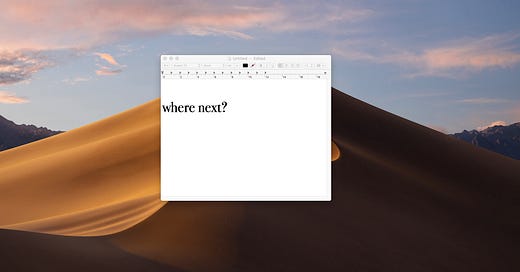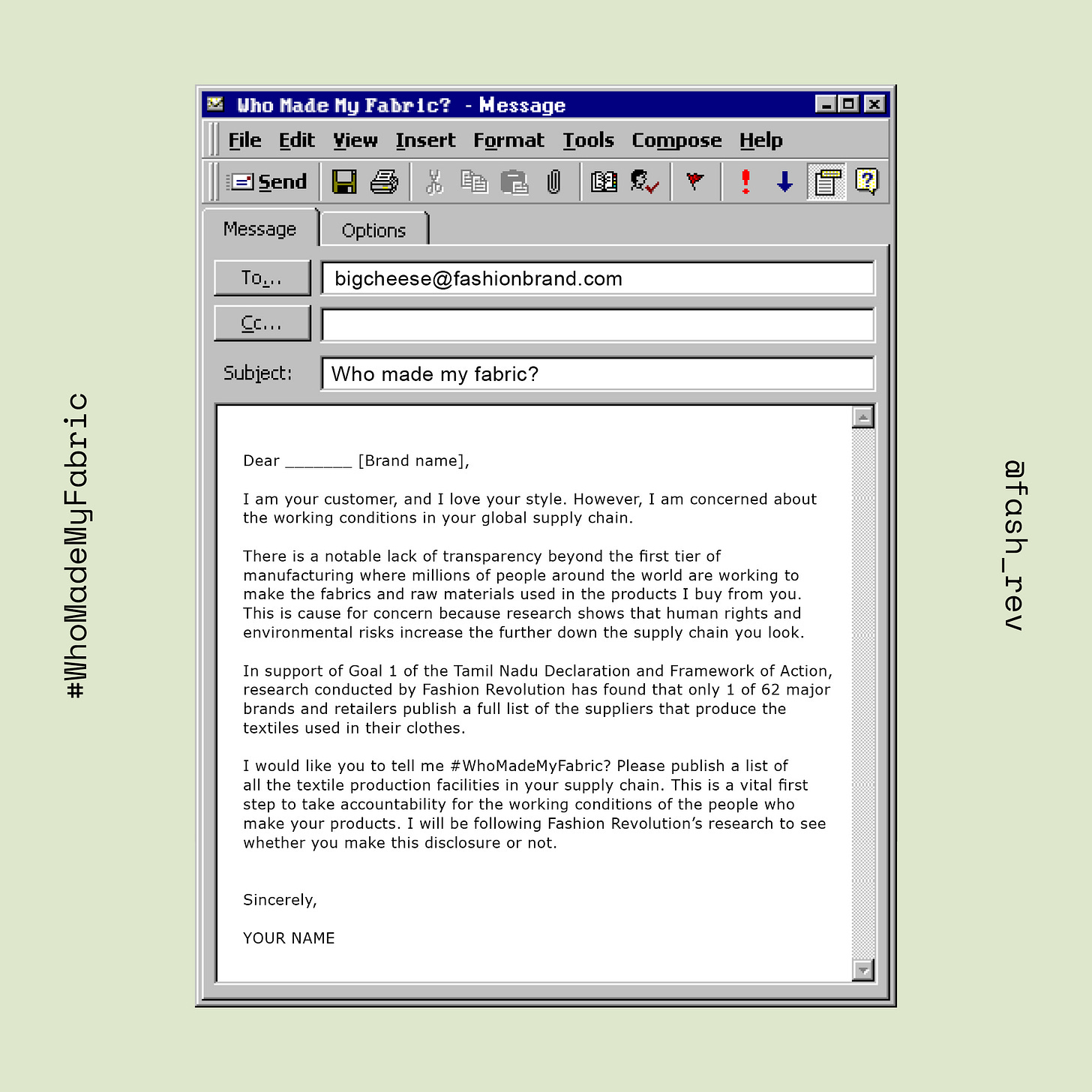If you enjoy my free content, you can donate the cost of a virtual coffee ☕
After an intense few weeks wrapping up at university and manning Fashion Revolution Week campaigns, I finally have a little more headspace to write, but I’ve been feeling increasingly disillusioned by showing up online and finding it tough to burn through burnout and use my voice in a valuable way outside of work. This, combined with my concerns about the ethics of our Silicon Valley Substack overlords, means I may take a little time to evolve this newsletter, perhaps using this space instead to amplify others. In the meantime, moving away from freelancing means that the pressure of content creation is waning, and with it, some reflection on where we are as a movement of people whose careers depend on hot takes about this hot planet.
As May Day approached last week, the chasm between the grassroots labour movement and the influencer industrial complex became increasingly clear. When we fail to centre the experiences of workers directly impacted by fashion’s exploitative and extractive business model and the stories of solutions and hope, we fall into the infighting trap, over and over again. Imagine if the energy we spend picking apart the specificities of sustainable fashion messaging instead was channeled into meaningful efforts to expand the movement and direct action that holds those in power to account - executives and policymakers making decisions that impact supply chain workers. Imagine if our narrative of inclusivity extended to acceptance of beginners, the rejection of shame as a tool of change, the understanding of a wide spectrum of ideas and the patience to resolve conflicts away from social media.
All this is to say that we have a lot of work to do to protect the positive progress that has been made over the past eight years since Rana Plaza. To progress beyond this current snail’s pace of change means we urgently need to step back, to think bigger, to shift the burden where it counts. Which leads nicely on to the #ProtectProgress initiative from Clean Clothes Campaign, an appeal to some of the world’s most powerful brands to extend the Bangladesh Accord on Fire and Building Safety, ensuring safe working conditions for the people who make our clothes.
The Bangladesh Accord is a legally binding agreement between apparel brands and global trade unions, ensuring that disasters like Rana Plaza never happen again. Unfortunately, the agreement expires on 31st May 2021. If the Accord is not renewed, the safety of over 2 million workers in 1,600 garment factories will be left in the hands of voluntary, non-enforceable Corporate Social Responsibility (CSR) initiatives, which as you can imagine, have been categorically unable to prevent mass casualties.
Brands must stop dragging their feet and sign on to the renewed Accord. The internationally binding agreement should also expand the proven model to other countries where garment workers still face unsafe working conditions. We shouldn't have to wait for another Rana Plaza for change to happen, because no one should die for fashion. Find out more and get involved.
In other news, a helpful tool to help you realise your power as part of the movement:
And this is a pretty urgent message for us all:
Reading list
One year on, what has the pandemic taught the fashion industry?
Fashion is chasing carbon neutrality. Carbon positive is better
Facing fashion’s overproduction issue: Solutions, new models and alternatives (paywall)
UK garment sector needs watchdog to stop brands abusing suppliers
MPs call on fast fashion giants to step up living wages for garment workers
India’s fashion artisans face ‘extreme distress’ in pandemic
Maxine Bédat urges fashion to make a change now, not in 2030
The human cost of fashion is taking its toll - Why can’t we understand the value of people?
Listening list
We released a mini bonus episode of Common Threads during Fashion Revolution Week. The new series - and some big news - is coming soon!
This episode of Wardrobe Crisis with Canopy founder Nicole Rycroft is a beautiful and urgent reminder of the need to protect the world’s forests.
Hot Take is such a fantastic podcast about the climate - this episode covers Big Tech's approach to climate change and climate journalism.
I’d highly recommend catching up on ‘Fashion and Degrowth’ pt 1 & pt 2 from Fashion Act Now, and also this gamechanging event from Cultural Intellectual Property Rights Initiative about how Indigenous communities combat cultural appropriation and conserve biodiversity.
Join a union
“The only effective answer to organized greed is organized labour.” - Thomas Donahue
Collective action = collective liberation. One of the oldest but most powerful tools to fight oppressive systems is by joining and supporting unions and collective bargaining organisations, in fashion and beyond. Freedom of association is one of the eight fundamental conventions of the International Labour Organisation, and has been since 1949. The United Nations Universal Declaration of Human Rights also states that the right to organize with others to fight for better working conditions is a universal human right: Everyone has the right to form and to join trade unions for the protection of his interests.
Thanks to the work of my dear friend Sinead McNulty, I am proud to be a member of Scotland’s tenants union, Living Rent. This movement increases tenant power by resisting evictions, rent hikes, private housing monopolies and supporting us to stand up ourselves and our homes.
In the fashion industry specifically, I’d highly recommend supporting the work of IndustriALL Global Union and Awaj Foundation. Union power for fashion supply chain workers is absolutely key to fight exploitation and abuse, negotiate wages and improve working conditions for themsleves and for future generations. More than 90% of workers in the global garment industry have no possibility to negotiate for their wages or conditions. If we want a fair system that offers decent pay, safe working conditions, and upholds the human rights of all workers, we need to demand that workers in every country and every factory and every industry access the power of union representation.
“And the thing is, none of this is very radical. Governments and policies can totally enable all of this and more. But we need to organise for this change. We especially need more solidarity across all scales, from local unions to national and transnational. Because as much as many of us suffer under shit working conditions etc, we also profit of the even worse working conditions of others. We have more in common than we think, and we are definitely more than they are - if we organise.” - Josephine Becker
Take action: Ask #WhoMadeMyFabric?
Fashion is not just made by garment workers in the country listed on the clothing label. Millions of people around the world grow fibres, process raw materials, mine minerals, spin yarns, weave cloth, dye, print, finish, embroider and embellish fabrics and much more. But the ethical fashion conversation often fails to recognise just how vast and complex the global supply chain really is. Most brands do not trace and publicly disclose the suppliers, sub-contractors and informal workshops, which can enable exploitative working conditions to thrive while obscuring who is responsible.
That’s why our new @fash_rev campaign supports grassroots organisations to demand justice for workers in textile mills and processing facilities. This is a great opportunity for citizens to reconnect with the materials that make up our clothes and really hold brands accountable - particularly the 60+ major corporations that are failing to take basic steps towards transparency beyond the first tier of the supply chain. This is also a chance for the small designers and home sewers to think about the fabrics they source and the questions they could ask suppliers to conduct real due diligence.
Click here to send an email to a brand to ask them #WhoMadeMyFabric?
Thanks for reading, I appreciate you.
Catch up on past issues of The Ethical Fashion Roundup here.
You can also sign up for the Fashion Revolution newsletter which I curate each week.
Ruth x









